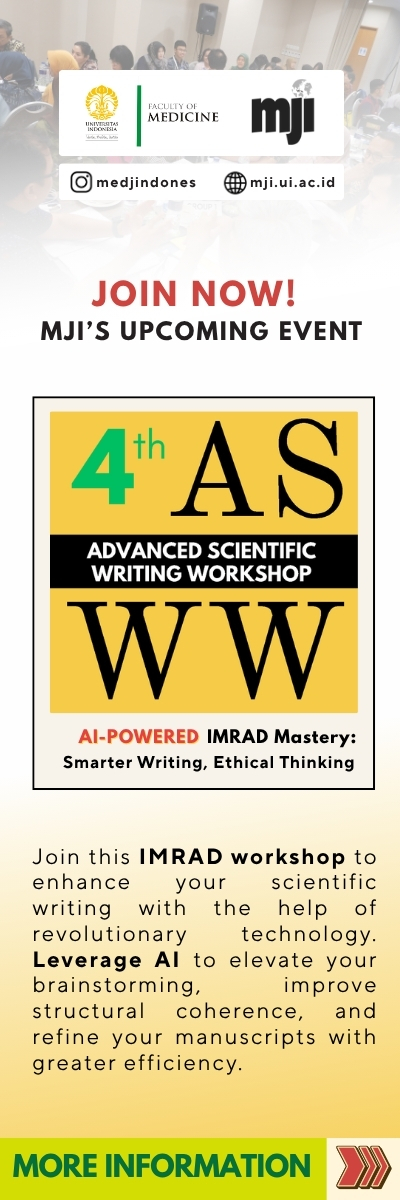Medicinal plants: source of new lead compounds in therapeutics
DOI:
https://doi.org/10.13181/mji.v22i3.578Abstract
[no abstract available]Downloads
References
Gurib-Fakim A. Medicinal plants: Traditions of yesterday and drugs of tomorrow. Mol Aspects Med. 2006;27:1-93. http://dx.doi.org/10.1016/j.mam.2005.07.008
Buenz EJ. Hold on to your memories: How recent findings will impact plant-based drug discovery. J Ethnopharmacol. 2007;114:279-80. http://dx.doi.org/10.1016/j.jep.2007.08.018
Ji HF, Li XJ, Zhang HY. Natural products and drug discovery. EMBO Rep. 2009; 10: 194 â?? 200. http://dx.doi.org/10.1038/embor.2009.12
Brusotti G, Cesari I, Dentamaro A, Caccialanza G, Massolini G. Isolation and characterization of bioactive compounds from plant resources: The role of analysis in the ethnopharmacological approach. J Pharm Biomed Anal. 2013; S0731-7085(13)00117-9.
Katiyar C, Gupta A, Kanjilal S, Katiyar S. Drug discovery from plant sources: An integrated approach. Ayu 2012. 33(1):10 â?? 9. http://dx.doi.org/10.4103/0974-8520.100295
Salim AA, Chin YW, Kinghorn AD. Drug discovery from plants. In: Ramawat KG, Merillon JM (eds). Bioactive molecules and medicinal plants. 2008. pg.1 â?? 25. ISBN: 978-3-540-75600-3. http://dx.doi.org/10.1007/978-3-540-74603-4_1
Cragg GM, Newman DJ. Drug discovery and development from natural products: the way forward. 11th NAPRECA Symposium Book of Proceedings, Antananarivo, Madagascar. pg. 56â??69.
Yolanda S, Andraini T, Kusuma I. Acalyphaindica root extract increase post-hypoxic rat hippocampal tissue culture cell viability via phospholipase A2 inhibition. Med J Indones. 2013;22:136-40. http://dx.doi.org/10.13181/mji.v22i3.581
Sutono T. Efficacy of Garciniamangostana L. (mangosteen rind extract) to reduce acne severity. Med J Indones. 2013;22:167-72. http://dx.doi.org/10.13181/mji.v22i3.586
Nahrstedt A, Hungeling M, Petereit F. Flavonoids from Acalyphaindica. Fitoterapia. 2006;77: 484â??6. http://dx.doi.org/10.1016/j.fitote.2006.04.007
Sanseera D, Niwatananun W,Liawruangrath B, et al. Antioxidant and anticancer activities from aerial parts of Acalyphaindica Linn. Chiang MaiUniv J NatSci. 2012;11: 157 â?? 68.
Abdullah N, Zulkifli KS, Abdullah A, Aziman N, Kamarudin WSSW. Assessment on the antioxidant and antibacterial activities of selected fruit peels. Int J ChemTech Res. 2012; 4: 1534-42.
Hiremath SP, Rudesh K, Badami S, Patil SB, Patil SR. J Ethnopharmacol. 1999; 67: 253 â?? 8. http://dx.doi.org/10.1016/S0378-8741(98)00213-X
Pedraza-Chaverri J, Cardenas-Rodriguez N, Orozco-Ibarra M, Perez-Rojas JM. Medicinal properties of mangosteen (Garciniamangostana). Food ChemToxicol. 2008; 46: 3227-9. http://dx.doi.org/10.1016/j.fct.2008.07.024
Wang JJ, Shi QH, Zhang W, Sanderson BJS. Anti-skin cancer properties of phenolic-rich extract from the pericarp of mangosteen (Garciniamangostana Linn.). Food ChemToxicol. 2012: 50; 3004 â?? 13. http://dx.doi.org/10.1016/j.fct.2012.06.003
Downloads
Published
How to Cite
Issue
Section
License
Authors who publish with Medical Journal of Indonesia agree to the following terms:
- Authors retain copyright and grant Medical Journal of Indonesia right of first publication with the work simultaneously licensed under a Creative Commons Attribution-NonCommercial License that allows others to remix, adapt, build upon the work non-commercially with an acknowledgment of the work’s authorship and initial publication in Medical Journal of Indonesia.
- Authors are permitted to copy and redistribute the journal's published version of the work non-commercially (e.g., post it to an institutional repository or publish it in a book), with an acknowledgment of its initial publication in Medical Journal of Indonesia.





































